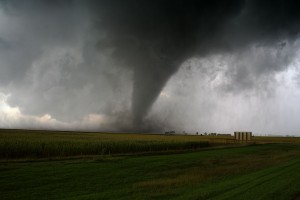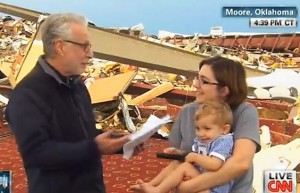Atheist by Storm: Interview with Rebecca Vitsmun

A little over three years ago, CNN correspondent Wolf Blitzer and television viewers were able to witness a teachable moment when it comes to common assumptions.
Speaking to a survivor of an EF5 tornado (a deadly, extremely destructive storm system) that devastated Moore, Oklahoma, Blitzer declared the woman and her family “blessed.” He followed by asking, “You’ve gotta thank the Lord, right? Do you thank the Lord for that split-second decision?” That survivor, Rebecca Vitsmun, responded by stating, “I’m actually an atheist.”
Vitsmun’s admission was a pleasant, explicit reminder that not everyone relies on god beliefs to, both figuratively and literally, weather the storm. I was able to catch up with Rebecca and engage her more fully about her life story, the aftermath of declaring herself an atheist on live television, and her humanist activism.
Q: Tell us about your background. Were you ever religious, and if so, when did you realize you were an atheist? Also, were you involved with organized atheism prior to your CNN spot with Wolf Blitzer?
Rebecca Vitsmun: I was raised Catholic and began to question my religion when I was fourteen, when I found objection with the Nicene Creed that we were required to say in unison with the congregation every week. It was the sentence, “We believe in one holy Catholic and apostolic church,” and I thought, “I don’t think Baptists are going to hell.”
As time progressed, I began to omit more and more lines from mass each week, but it wasn’t until I was nineteen, when I began to solidify my thoughts on abortion, that I finally started to make my move away from Christianity. It was impossible for me to believe that it was immoral for a woman to make the decision she needed to make for her own body and pregnancy; in fact, it seemed more moral to allow her to make that decision for herself.
After this, I decided to take comparative religion courses in college, hoping to find the “correct” religion. I eventually moved toward the thought that all religions were correct and talking about the same thing before eventually coming to see that none of it had to do with the metaphorical stories.

Rebecca Vitsmun is interviewed on CNN by Wolf Blitzer in 2013
From about 2009 to 2012, I was involved with the Oklahoma Atheists and would attend occasional meetings, but I disengaged with the group when my son became ill. I did not become actively involved with any form of organized atheism again until after I was on CNN on May 21, 2013.
Q: After declaring yourself an atheist on live television, what type of responses did you receive from family, friends, and strangers?
Rebecca: My mom cried and said, “But you’re not really an atheist, because you believe in a higher power,” and I said, “Mom, I wouldn’t have used the word atheist if I didn’t mean it.” My dad said, “Don’t let those people make you their spokesperson.” Most other family members didn’t say much of anything at all. One of my husband’s aunts complained about the fact that I started to make atheist posts on Facebook, but that didn’t affect what I decided to continue posting. I was unfriended by several old coworkers and “friends” from high school, but not by anyone who had true meaning in my life. After I started to wear atheist shirts, I noticed that the vast majority of people who disagreed with the sentiment would just divert their eyes when they read the shirt. The only people who approach me are always other atheists happy to see an open atheist walking around.
Q: What type of activism have you been involved in since that CNN interview three years ago?
Rebecca: I’m now the development coordinator of Humanist Disaster Recovery Teams which is part of the Foundation Beyond Belief. I was the team leader of the first deployment of that program in January of this year. I’m also a once-a-month co-host of the radio program, “Ask an Atheist,” a board member of the Humanists of Washington, and am currently a lead organizer in developing Rainier Oasis in Tacoma, WA.
Q: How do you define humanism and why do you think humanism is important?
Rebecca: Humanism is a nontheistic moral framework by which people come together under the premise our common humanity binds us as we strive to accept all, without regard to race, religion, ethnicity, class, sex, sexual orientation, gender identity or expression, age, ability, family structure, or any other non-harmful individuating characteristic. Humanists value evidence over the supernatural and strive toward developing a better world.
I believe humanism is important because it places a system of moral values upon what is otherwise a blank slate state of existence. Atheism means nothing more than a lack of believe in deities. Simply stating your atheism has essentially no value once you live in a world without religion; it’s only an identifier when dealing with the belief that exists outside of yourself and within the minds of believers.
The identifier, humanist, allows us to be forward with the shape of our moral framework and gives a better understanding of how we process other human beings and our world.
